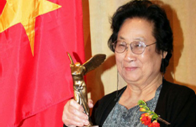0 139549 139557 139563 139567 139573 139575 139579 139585 139587 139593 139599 139603 139605 139609 139615 139617 139623 139627 139629 139633 139635 139639 139641 139643 139644 139645 139647 139648 139649 139651 139653 139657 139659 139663 139665 139669 139675 139677 139683 139687 139689 139693 139699 139705 139707 139713 139717 139719 139725 139729 139735 139743 151629
 Tu Youyou,an 84-year-old female(女性)scientist,became the first Chinese to win a Nobel Prize in science on Oct 5.Before that,she ever won the 2011Lasker Award for finding out artemisinin (Qinghaosu),which saved millions of lives.She was grateful(感激的) for the Lasker prize,but said,"It is just a scientist'duty.I will go on fighting for the health of all humans."
Tu Youyou,an 84-year-old female(女性)scientist,became the first Chinese to win a Nobel Prize in science on Oct 5.Before that,she ever won the 2011Lasker Award for finding out artemisinin (Qinghaosu),which saved millions of lives.She was grateful(感激的) for the Lasker prize,but said,"It is just a scientist'duty.I will go on fighting for the health of all humans."